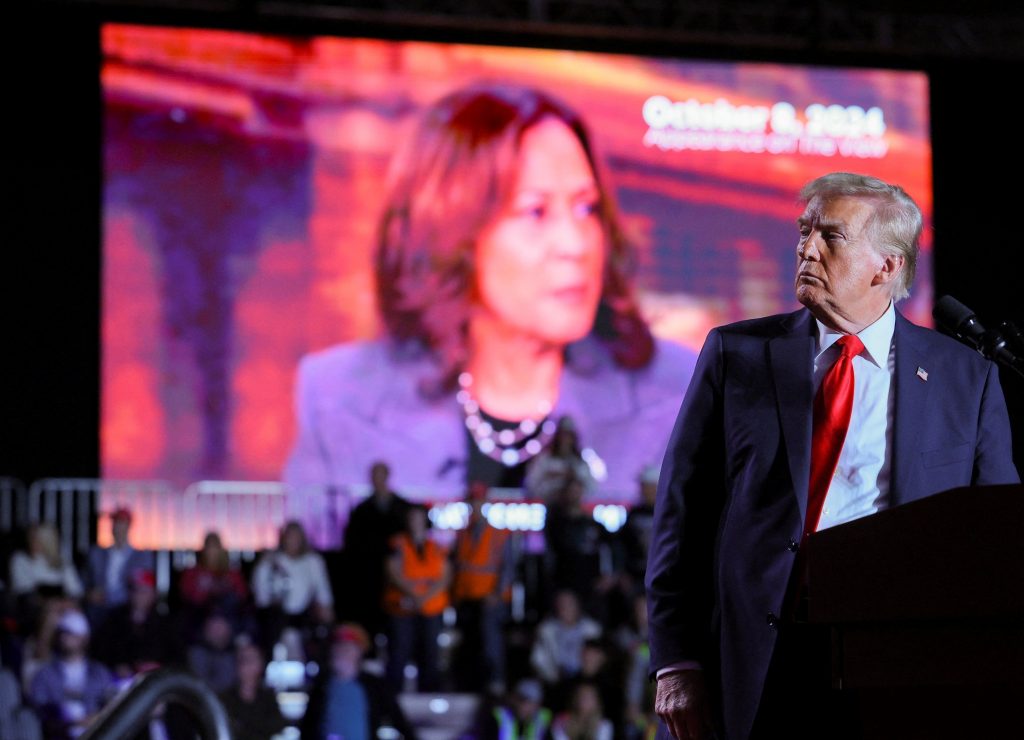Donald Trump used the final hours of his campaign to paint a bleak picture of the nation being “conquered” by his political opponents and migrants, often proudly veering into dark rhetoric and a list of grievances. Kamala Harris presented an upbeat message that focused on a “new generation of leadership”—and purposely avoided naming her rival.
The conflicting messages by the two presidential nominees reveal their opposing bets on how to appeal to a divided nation as the election comes to a close. Trump has banked on the idea that voters are angry and in need of saving. Harris, meanwhile, has sought to appeal to an exhausted nation, emphasizing the need for hope and unity now and in the days ahead.
The split-screen also showcased how the two are trying to compensate for their biggest vulnerabilities as they crisscrossed the nation on the final day before Election Day. Harris is running against a persistent level of negativity about the direction of the country, the kind of which few incumbent-party nominees survive. Trump is trying to overcome high unfavorability marks and a public with entrenched opinions about him.
At the close, it is Trump whose vulnerabilities were on full display. During a Monday rally in Raleigh, N.C., he made outlandish comments about migrants invading the country, vented over “not nice” things said about him by Michelle Obama and repeatedly lamented that President Biden was removed from the ticket in a “coup.”
“We are being conquered, can you believe that?” Trump said. “We will be a free and proud nation once again.”
And in recent days, he has used violent imagery directed at the media and former Rep. Liz Cheney , an anti-Trump Republican.
Such comments play right into some of his biggest weaknesses: The Wall Street Journal’s late October national poll found more voters said Harris, rather than Trump, had the right temperament for the office and was “mentally up for the job.” By 13 points, more voters said the word “unstable” fit Trump more than Harris.
Democratic Michigan Gov. Gretchen Whitmer, a top Harris surrogate, said Trump has promoted “grievance politics” during the campaign’s final weeks. “I don’t know what it does for an independent voter who’s trying to figure out who’s actually going to care about them,” Whitmer said.
Trump’s event in North Carolina reprised a number of grievances: He called Nancy Pelosi, the former House speaker, “crazy as a bedbug” and reminded them of her shredding of his third and final State of the Union speech in 2020. “Remember she ripped up the paper behind me? She could’ve gone to jail for that,” Trump said.
The former president also vented frustration at Michelle Obama, who has become a high-profile Harris surrogate critical of Trump. “She hit me the other day, I was going to say to my people, ‘Am I allowed to hit her now?’” Trump said, telling the audience he was talked out of it by advisers.
Since 2015, Trump has been a deeply polarizing political figure. His unapologetic, politically incorrect rhetoric has won him both die-hard supporters and the staunchest of critics.
James Blair, a top strategist for the Trump campaign, said that favorability—often a factor voters consider—is “not quite the right metric” in this election, arguing that voters in 2024 were more focused on job approval. On favorability, he argued that the two candidates poll roughly the same.
“What’s not that close is the job approval,” Blair said, speaking to reporters Friday. “With [persuadable voters], she is actually much closer to Joe Biden’s very, very negative job approval than she is to President Trump.”
The Journal’s October poll backs up that Harris’s job approval rating is roughly in line with President Biden’s, albeit slightly better, and that Americans view Trump’s performance while in office better than they did years earlier.
“In the abstract, a normal Republican nominee right now should win this election by 10 points,” said Doug Sosnik, a Democratic strategist. “By the same token, if you had a popular Democratic nominee, he or she should easily be able to beat a guy like Donald Trump, the majority of people never supported and don’t want him back in office for another four years. But that’s not the campaign we’re dealing with.”
Trump also sought to put one of Harris’s biggest vulnerabilities on display in the final stretch: voters’ sour outlook on the economy, and their view, according to public polls, that Trump would better handle it. Job growth slowed sharply last month, with workers sidelined by hurricane effects and the Boeing strike, according to a Friday report from the Labor Department. “This jobs report is a catastrophe and definitively reveals how badly Kamala Harris broke our economy,” the Trump campaign said. On the other hand, U.S. gross domestic product increased at a 2.8% annual rate in the third quarter, representing solid growth.
Harris didn’t mention Trump by name in her East Lansing, Mich., rally on Sunday night, which aides said was done intentionally to share a positive message with the nation. And in Pennsylvania on Monday, Harris urged her supporters to enjoy the moment, which she called the “best of who we are as a democracy.”
“This whole era of this other guy,” Harris told campaign volunteers in Scranton, Pa., referring to Trump. “What it’s done, with all that talk that’s been about trying to have us point fingers at each other and divide each other, it makes people feel alone. It makes them feel like there’s nobody standing with them.”

Republican presidential nominee and former U.S. President Donald Trump looks on as a screen shows Democratic presidential nominee U.S. Vice President Kamala Harris during a campaign rally at Macomb Community College in Warren, Michigan, U.S., November 1, 2024. REUTERS/Brian Snyder
“Let’s be intentional about building community…reminding people we all have so much more in common than what separates us,” Harris said.
The Harris team thinks the vice president is overcoming voter concerns about the economy by presenting plans for lowering prices and has argued that Trump’s proposed policies are a threat to economic growth.
The vice president has released proposals to lower housing and child-care costs as she works to overcome negative perceptions of the U.S. economy under Biden, with voters frustrated by high costs.
“We’re having a conversation regarding what people care about most, and that’s lowering costs,” said Jefrey Pollock, a Harris campaign pollster. He pointed to public polling that has shown Harris competitive with Trump on economic issues, including on inflation.
Harris was bullish in East Lansing, telling her supporters: “We have momentum. It is on our side. Can you feel it?”
A senior Harris official said that the campaign’s ground game was paying dividends, and that “we do believe that we are on track to win a very close race if we keep doing the work.”
If Harris wins, she would become only the second sitting vice president to be elected to the White House since 1836, following George H.W. Bush in 1988. She would need to overcome Biden’s high disapproval ratings and majorities of Americans who think the country is on the wrong track, an attribute that has hurt presidential candidates representing the incumbent party in past election cycles.
The Journal’s October poll found that 64% of Americans said the nation was headed in the wrong direction, compared with 26% who said it was moving in the right direction. In 2020, when Trump was defeated by Biden, a WSJ/NBC News poll found 60% of Americans said the country was on the wrong track, while in 2016, when Trump beat Hillary Clinton, the poll found 65% of the country said the nation was moving in the wrong direction.
“As the incumbent vice president, given the negative sentiment about the Biden administration and with 64% of voters believing the country is off on the wrong track, it is hard for Harris to get much traction as the candidate of change,” said Republican pollster Bill McInturff.
Mark Campbell, who managed Republican Glenn Youngkin ’s winning 2021 Virginia governor’s race, said Harris had done little to distinguish herself from Biden. He pointed to an interview on ABC’s “The View,” where Harris said “not a thing comes to mind” when asked if she would do anything differently.
After Election Day, Campbell said, “you are going to see a whole body of literature about how both campaigns might have been the worst last two or three weeks ever run in U.S. history.”



